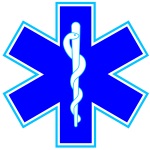Heat Emergencies: Difference between revisions
From Protocopedia
| Line 22: | Line 22: | ||
* Semi-reclining position with head elevated 15 - 30 degrees if systolic BP greater than 90 mm Hg. Evaluate and take precautions for increased intracranial pressure. | * Semi-reclining position with head elevated 15 - 30 degrees if systolic BP greater than 90 mm Hg. Evaluate and take precautions for increased intracranial pressure. | ||
* Initiate rapid cooling: Remove as much clothing as possible to facilitate cooling. Cold-packs to lateral chest wall, groin, axillae, carotid arteries, temples and / or behind knees. Sponge with cool water or cover with wet sheet and fan body. | * Initiate rapid cooling: Remove as much clothing as possible to facilitate cooling. Cold-packs to lateral chest wall, groin, axillae, carotid arteries, temples and / or behind knees. Sponge with cool water or cover with wet sheet and fan body. | ||
[[Category:Medical]] | |||
Revision as of 01:44, 2 April 2012
Section 5 -MEDICAL
5.07 HEAT EMERGENCIES
HEAT CRAMPS: INITIAL MEDICAL CARE (2.01).
- Move patient to a cool environment and evaluate the need for transport.
HEAT EXHAUSTION:
INITIAL MEDICAL CARE (2.01) - Provide OXYGEN or assist ventilations as appropriate for patient condition.
- If systolic BP less than 90 mm Hg Fluid boluses in increments of 200 - 300 ml, to titrate systolic BP greater than 90 mm Hg.
- Move patient to cool environment.
- Place in supine position with feet elevated.
- Remove as much clothing as possible to facilitate cooling.
- Sponge with cool water or cover with wet sheet and fan body.
HEAT STROKE:
INITIAL MEDICAL CARE (2.01) - Provide OXYGEN or assist ventilations as appropriate for patient condition.
- If systolic BP less than 90 mm Hg, Fluid boluses of cooled normal saline if available, in increments of 200 - 300 ml, to titrate systolic BP greater than 90 mm Hg.
- Move patient to cool environment.
- Semi-reclining position with head elevated 15 - 30 degrees if systolic BP greater than 90 mm Hg. Evaluate and take precautions for increased intracranial pressure.
- Initiate rapid cooling: Remove as much clothing as possible to facilitate cooling. Cold-packs to lateral chest wall, groin, axillae, carotid arteries, temples and / or behind knees. Sponge with cool water or cover with wet sheet and fan body.
